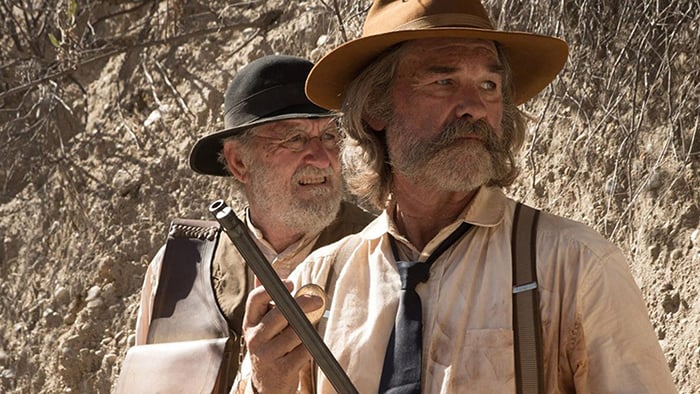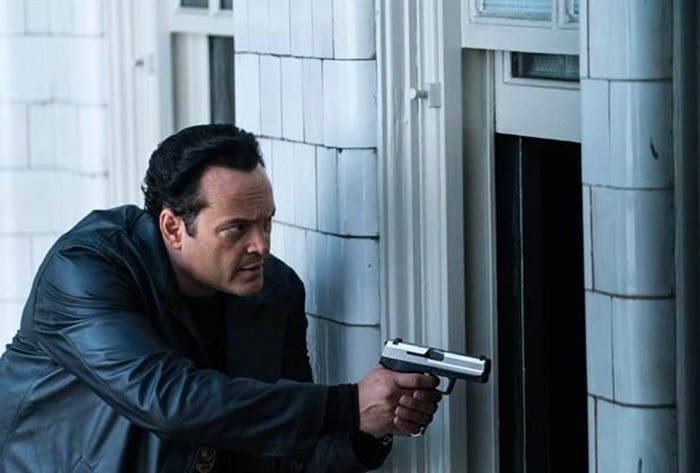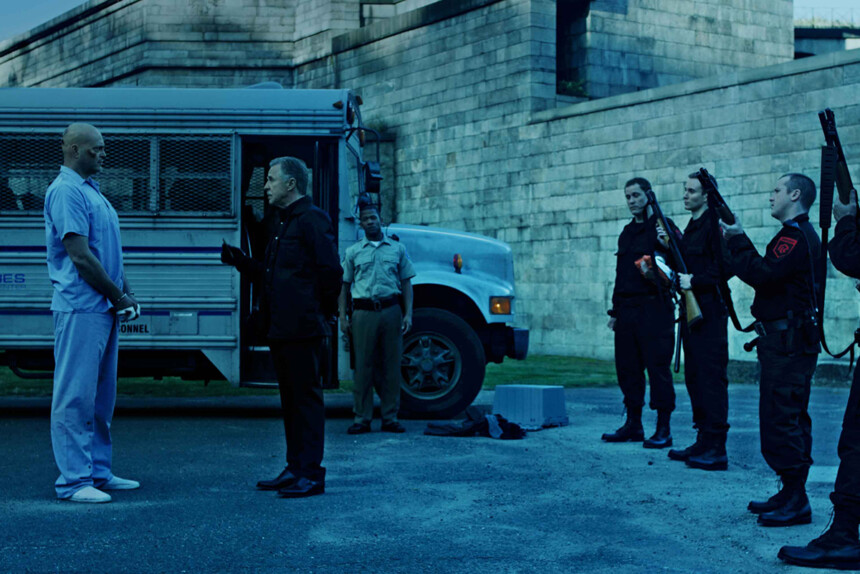A cowboy is scalped and cannibalized by Indians. A villain’s head is stomped from his shoulders into the squat hole of an ancient, grim prison. A beautiful woman is executed with a machine gun blast to the face.
Not everyone has the stomach for the violence that abounds in the movies of dissident director S. Craig Zahler. Just as disturbing to critics are his apparently right-wing motifs and the rogues’ gallery of known conservative actors—such as Kurt Russell, Vince Vaughn, and Mel Gibson—with whom Zahler assaults the sensibilities of his audience.
Zahler, who is Jewish, has guardedly described himself as “right of center” on the political spectrum. He insists he is not out to “make a political point” with his movies. Questions about whether his films are racist or catering to conservatives seem to bore him. He doesn’t care much what detractors “climbing their angry towers and blowing the bugle of indignation” think about him, Zahler told Yahoo News. That his films are simultaneously praised for satirizing the “alt-right” and denounced for pandering to the “alt-right” amuses Zahler, who views himself “first and foremost as a writer.”
In an industry defined by unsubtle, hand-fed narratives, values, and views, Zahler is a rarity. He wants nothing more than to lead you on a noctambulation through the lonely deserts, malevolent caves, and vicious dungeons of the human condition.
Indeed, debates about Zahler’s political leanings miss the most important aspect of his work: he is, at heart, a tragedian, never quite preaching to the audience, but bringing them into sober and stark confrontation with themes ranging including race, human nature, justice, and the divine.
Zahler’s closest literary analogue is Cormac McCarthy, who strips novels of most punctuation because the author says there’s “no reason to blot the page up with weird little marks.” Declarative minimalism generates clarity of vision. Likewise, Zahler completely strips some of his movies of scores or uses them only sparingly. If you do not find his yarns compelling, “it would be risible if there was sad music telling you it was so,” he said in his interview with Yahoo News.

above: writer/director Steven Craig Zahler (Wikimedia Commons)
Zahler’s 2015 directorial debut, Bone Tomahawk, takes viewers on an odyssey from the small frontier town of Bright Hope into the Valley of the Starving Men. A Western horror-drama that begins at the edge of civilization and then descends into a black pit of inhuman savagery, it is reminiscent of John Ford’s epic The Searchers (1956). The flash point of both movies is the abduction of women, and the campaigns to retrieve them are organized by flawed men who are nevertheless honorable in their own way.
Patrick Wilson is cast as Bone Tomahawk’s crippled cowboy whose wife (Lili Simmons) is stolen away by a band of inbred cave dwellers, or “troglodytes.” Leading the anabasis from Bright Hope with Wilson on crutches is the stoic local sheriff, played by Kurt Russell, his aging and pious deputy, played by Richard Jenkins, and a mysterious Lothario and veteran of the Indian Wars played by Matthew Fox.

above: actors Richard Jenkins and Kurt Russell in a still from the 2015 film Bone Tomahawk, written and directed by S. Craig Zahler (RLJ Entertainment)
At the outset, Fox’s character informs the group that he’s killed more Indians than the entire posse combined. “Well, that’s an ugly boast,” responds The Professor, an educated Indian who provides clues about the whereabouts of the enemy clan. “It isn’t a boast, but a fact,” Fox shoots back as the group departs from civilized society.
The director’s passion for world-building—as seen in the name of his hobby heavy metal band, Realmbuilder— is revealed here. As the heroes of Bone Tomahawk trek into unforgiving outer darkness for a taut two hours, Zahler engrosses viewers in speculative dialogue between his Western characters that ranges from funny—“Do only fools marry?”—to philosophical—“Is it ever moral to execute an unarmed man?” and “Are men ever justified in killing women and children?” Some of these questions have obvious ethical implications, but they also gesture toward one of the film’s fundamental themes: What is the difference between a man and a savage?
The façade of civilization is already bone-thin in Bright Hope, so the crew doesn’t have to wander far before all the rules and trappings of civility are torn away. They are soon forced to grapple with their own beliefs, demons, and preconceptions. For most of the film, our posse’s enemies are the elements themselves. Wilson is the most impressive here, crutching his way over rough terrain by sheer force of will and the grace of God. The troglodyte tribe does not reappear until the very end, when Zahler’s contentious quartet has evolved into a clan of its own.
Zahler lays viewers down on a suspenseful bed of nails and they never know when one or all the points will pierce their skin. The confrontation and conclusion defy expectations. In the end, we learn that the state of nature is the great equalizer and that in the land of the wicked and lawless, it pays to be pious.
Two years after Bone Tomahawk became a hit, Zahler released Brawl in Cell Block 99, a neo-noir prison drama featuring Vince Vaughn as the leading man. Here the director’s talent for inverting conventions is felt immediately. Vaughn plays Bradley Thomas, a retired boxer and former drug mule trying to keep on the straight and narrow as a tow truck driver. The film begins with the end of his blue-collar vocation: Thomas is laid off, a victim of the weak economy. The long hours of work, for which he has nothing to show, have already wrecked his marriage. After reflecting on how the law of averages should have provided him with a break by now, he concludes: “I don’t think things even out fair like that.” So Thomas returns to his old life, determined to “drive packages for a friend” only as long as it takes to claw up from poverty and save what remains of a relationship with his wife, played by Jennifer Carpenter.
Our antihero is a family man fiercely protective of his blood. Vaughn stands around 6’ 5”, and Zahler’s camerawork makes us feel the full weight of his character towering over us like a Cossack warrior. Thomas is deeply patriotic, a fact revealed by the American flags that follow him throughout the film and the twitch of murderous rage in his eye when two Mexicans gleefully litter—“Help make America beautiful, right?” one of them says. When Thomas is confronted by gangsters who later call him a “gringo,” he engages in some hilariously subversive cultural and linguistic revanchism: “Don’t call me a foreigner. Last time I checked, the colors of the flag weren’t red, white, and burrito.”
At a pivotal point in the movie, Thomas comes to the aid of police officers when they are attacked by his drug-smuggling Mexican associates, one of whom yells just before he intervenes, “You ready for 9/11 part two?” But no good deed goes unpunished, and honor bound against snitching, our protagonist ends up behind bars. Zahler’s commentary about the American penal system may give pause to conventional conservatives and liberals alike. “I’m aware that the system is harder on guys that distribute drugs than it is on men who commit acts of violence against women and children,” Thomas tells a detective who pleads with him to snitch. “Do you think that’s fair?”
The question is, of course, rhetorical; a key point of Cell Block 99 is that life is unfair, and Zahler’s innovation is making a white man the victim of the system. It is a black judge who sentences him severely, even though Thomas is a firsttime offender who did the right thing. A black prison guard bullies him, the man hired to kill his unborn child is Korean, and his nemesis is a Mexican smuggler. It is the straight, white male and loving husband who is utterly dehumanized, deprived of his dignity, stripped down to nothing but the huge crucifix tattooed to the back of his shaved head. Thomas becomes a force of nature, a Diomedes among prison brawlers. His comfort is that only God can judge him and that he and his thundering fists will arrange meetings between the Almighty and his enemies.

above: actor Vince Vaughn in a still from the 2018 film Dragged Across Concrete, written and directed by S. Craig Zahler (Lionsgate)
The final installment of Zahler’s ultraviolent trilogy is Dragged Across Concrete, released in 2018. Vaughn returns to the screen as Anthony Lurasetti, a police detective and partner to Brett Ridgeman, played by a thoroughly salty Mel Gibson. Though Lurasetti is several years Ridgeman’s junior, both are hardboiled relics of a bygone era, trapped in a time that needs, but doesn’t want, gunslinging gumshoes with short fuses. Gibson’s weapon of choice, the Colt Python, a nickel-plated .357 Magnum revolver, screams atavism.
The terrible twosome rough up suspects, mock criminal immigrants’ accents and customs, and live by a code incompatible with the etiquette of tenderness, a code which has kept them alive but effectively guaranteed the impossibility of upward mobility in the modern world. Gibson’s character recognizes and resents this inescapable fact of life, which ultimately leads him to the edge of darkness, at which point he reflects:
I’m one month from my 60th, and I’m the same rank I was at 27. For a lot of years, I believed that the quality of my work—what we do together, and what I did with my previous partners—would get me what I deserved. But I don’t politic, I don’t change with the times, and it turns out that all that shit’s more important than good, honest work.
Here again, Zahler interrogates what is in vogue, particularly the idea of whether diversity is a strength. The police department’s chief lieutenant suggests to the duo that they can expect reprisal from a “Mexican-American inspector” over an incident in which they manhandled a Mexican criminal. “Politics,” huffs Ridgeman contemptuously. “Like always.” Zahler replies in the mouth of the chief lieutenant:
Right. Like cell phones—and just as annoying—politics are everywhere. Being branded a racist in today’s public forum is like being accused of being a communist in the ’50s. Whether it’s a possibly offensive remark made in a private phone call or the indelicate treatment of a minority who sells drugs to children, the entertainment industry formerly known as ‘The News’ needs villains.
Why should Ridgeman continue playing along? A lifetime of protecting and serving an increasingly ungrateful city has only brought him pain and suffering.
Lurasetti is an Army veteran who struggles in his personal life as a financially strapped cop. His wife has multiple sclerosis and walks with a cane. His daughter is harassed by black thugs in their unsafe neighborhood, but it’s the only place where they can afford to live. Ridgeman sees their problem clearly: Doing the “right thing” in a society that has inverted right and wrong doesn’t pay.
Zahler casts Tory Kittles as Gibson’s opposite in a parallel but gradually converging storyline. He plays Henry Johns, an ex-convict who, like the protagonist of Brawl in Cell Block 99, takes up crime for the sake of family. Johns provides a familiar counterweight as the not-so-bad-guy deserving redemption. But Zahler’s boldness lies in his willingness to present characters like Gibson’s wife, a white liberal and ex-cop turned mother who utters conflicted thoughts such as: “I never thought I was a racist before living in this area.” And if his characters are race-conscious, they’re also class-conscious. “My job [in a bank] is so stupid,” a female character laments. “I go there and I sell chunks of my life for a paycheck so that rich people I’ve never even met can put money in places I’ve never even seen.” Zahler, neither glorifying nor preaching, reveals the everyday life that Hollywood glosses over.
What is a man if he cannot provide for and protect his wife? What kind of society tears working mothers away from their children? If the law rewards criminals and is a slave to the politically correct, is it morally permissible to take justice into your own hands? At what point does racial profiling become a legitimate act of self-defense? If you are willing to face unsettling questions about the nature of modern reality without apoplexy, Zahler is holding the door open and inviting you to join him on a shotgun safari.
Image Credit:
above: actors Vince Vaughn and Don Johnson in a still from the 2017 film Brawl in Cell Block 99 , written and directed by S. Craig Zahler (RLJE Films)
